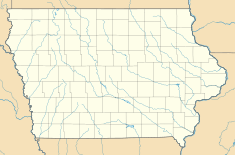Delhi Dam facts for kids
Quick facts for kids Delhi Dam |
|
|---|---|
|
Location of Delhi Dam in USA Iowa
|
|
| Location | Delhi Township, Delaware County, near Delhi, Iowa |
| Coordinates | 42°24′28″N 91°20′43″W / 42.40778°N 91.34528°W |
| Construction began | 1922 |
| Opening date | 1929 |
| Owner(s) | Lake Delhi Recreation Association |
| Dam and spillways | |
| Type of dam | Embankment, concrete outlet section |
| Height | 59 ft (18 m) |
| Length | 704 ft (215 m) (Concrete section) |
| Spillway type | Service, gate-controlled ogee |
| Spillway capacity | 32,000 cu ft/s (910 m3/s) |
| Reservoir | |
| Creates | Lake Delhi |
| Total capacity | 3,790 acre⋅ft (4,670,000 m3) |
| Catchment area | 347 sq mi (900 km2) |
| Surface area | 218 ha (2.18 km2) |
| Power station | |
| Commission date | 1929 |
| Decommission date | 1968 |
| Turbines | 2 |
| Installed capacity | 1.5 MW (Proposed) |
| Website Lake Delhi Recreation Association |
|
The Delhi Dam, also known as Hartwick Dam, was a large wall built across the Maquoketa River in Delhi, Iowa. It created a big lake called Lake Delhi. The dam was part of the Turtle Creek Recreation Area. A local community group owned and managed it.
Sadly, the dam broke on July 24, 2010, after a lot of heavy rain. This caused Lake Delhi to empty out.
Contents
Building the Delhi Dam
The Delhi Dam was built between 1922 and 1929. It was first made by the Interstate Power Company. Its main purpose was to create electricity using the power of flowing water.
However, the dam's generators stopped working in 1973. Soon after, the Lake Delhi Recreation Association took over the dam. From then on, the dam and Lake Delhi were mostly used for fun activities like boating and fishing.
Dam Repairs and New Plans
In 2008, several floods caused a lot of damage to the dam. The repairs cost about $500,000. In October 2008, the Association made a plan to restart the power plant. They wanted to fix the old turbines and make electricity again.
The new power plant was planned to have two turbine generators. These could make 1.5 megawatts of power. This would produce enough electricity to sell to the local power company. They hoped to start making power by 2010.
In 2009, the Iowa Department of Natural Resources checked the dam's safety. They found only small problems at that time.
The Dam Breaks in 2010
The southern part of the Delhi Dam broke on July 24, 2010. This happened because of extremely heavy rainfall. About 10 inches (250 mm) of rain fell in just twelve hours.
What Caused the Failure?
Before the dam broke, the river levels upstream were very high. They reached 24.22 feet (7.38 m), which was 10 feet (3 m) above the normal flood level. This broke the old record from 2004.
Only two of the dam's three gates were fully open to let water through. The water eventually flowed over the top of the dam. This caused a 200-foot (61 m) section of the dam and the road on top to wash away. As a result, Lake Delhi completely emptied.
Impact on Communities
About 8,000 people living downstream had to leave their homes. This included people in towns like Hopkinton and Monticello. The dam breaking caused millions of dollars in damage.
In Monticello, 50 homes and 20 businesses were badly flooded. The city's water treatment plant was also flooded. This left many residents without sewer services.
People who owned property near the lake paid special taxes to help maintain it. Because of the dam's failure and previous debts, it was unclear if the dam could be rebuilt.
Why the Dam Failed
In December 2010, a group of engineers studied the dam's failure. They found that the main cause was "internal erosion" inside the dam's wall. This happened along with water flowing over the top.
They believed that a broken spillway gate and the larger size of the lake made the problem worse. The dam's wall was not built perfectly. A concrete wall inside the embankment was not tall enough. This sped up the erosion and allowed water to flow over the top.
Rebuilding the Dam
By March 2012, people had donated $1.7 million to help replace the dam. Local and county groups also approved $9 million in funding. The state was asked to provide another $5 million for repairs. At that time, the total cost was estimated to be around $12 million.
In April 2014, work began on a new $16 million project. This project aimed to replace the broken Delhi Dam wall and spillway. The new dam was planned to be finished by October 2015.
The state contributed $5 million to the project. The county added $3 million. Property owners in the area paid the rest through special taxes. By September 2016, the river level was back to normal, and Lake Delhi was refilled.
 | Chris Smalls |
 | Fred Hampton |
 | Ralph Abernathy |


